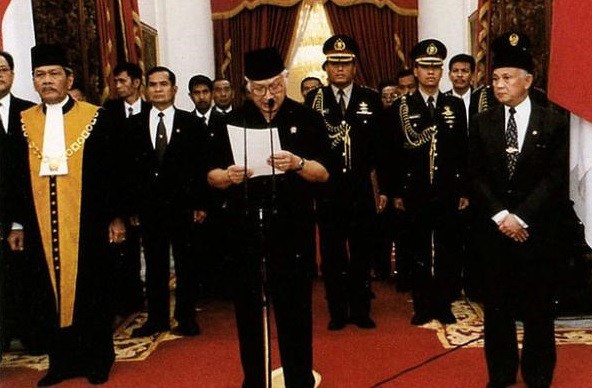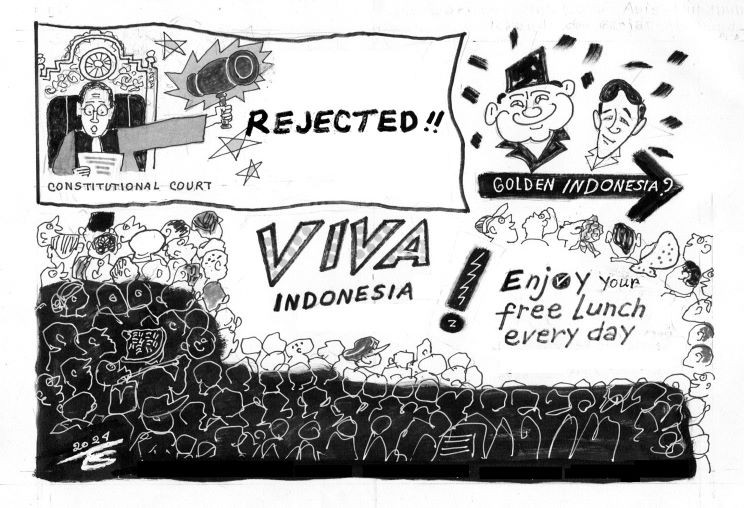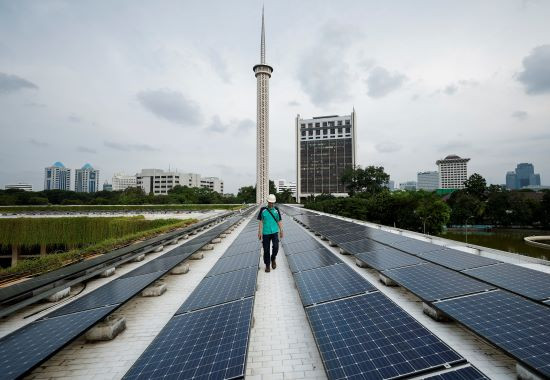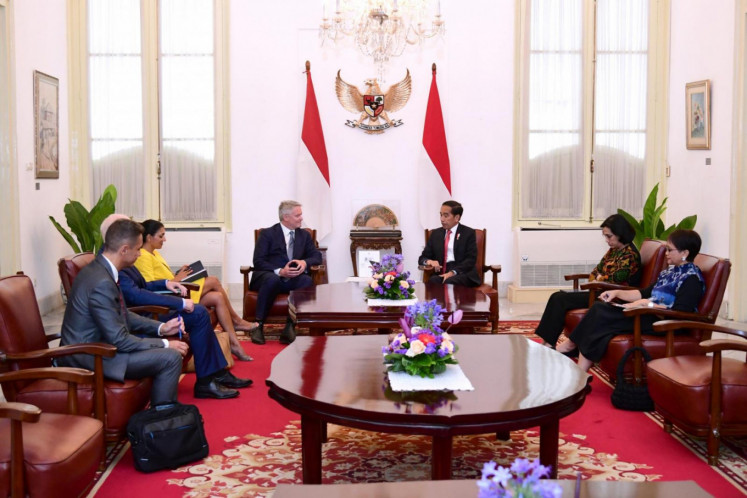The problem with heroes
In Chapter 28 of Cindy Adams’s famous book, Sukarno: An Autobiography as told to Cindy Adams, we look at the story of A. K. Gani, a high-ranking Indonesian official in the early days of independence who happened to smuggle a lot of gold, silver and rubber. What he did might have been fine in those days—his contribution even made him a national hero. However, it is safe to say that smuggling anything would be an act of political suicide for any of today’s ministers.
Change Size
 President Soeharto announced that he was resigning as President of Indonesia at the Merdeka Palace, Jakarta on May 21, 1998. Human rights activists are opposed to naming late dictator Soeharto a national hero and have urged the government to reject the idea, given the late president's track record of alleged human rights abuses and corruption. (Kompas.com/-)
President Soeharto announced that he was resigning as President of Indonesia at the Merdeka Palace, Jakarta on May 21, 1998. Human rights activists are opposed to naming late dictator Soeharto a national hero and have urged the government to reject the idea, given the late president's track record of alleged human rights abuses and corruption. (Kompas.com/-)
I
n 2045, we will probably no longer appreciate our heroes as much as we do now, as suggested in the 2045 Indonesia Scenario, a set of predictions produced by the National Resilience Institute. The scenario suggests that respect for and pride connected with national heroes – and the willingness to follow their paths – will no longer motivate the Indonesian youth in facing the challenges of their era.
This is not necessarily a bad thing. This phenomenon might be the result of progress in critical thinking and the freedom of information. Such progress makes us skeptical toward our so-called heroes. We challenge the authorities more and more each day.
Today we have sophisticated technologies and techniques of criminal investigation. They used to be obstructed in the past, when political power was centralized. Now, the ever-growing spread of power among numerous political parties—which breeds political rivalries—allows criminal investigation authorities to target anyone. As a result, people with ‘dirt on their hands’ will be spotted immediately, no matter how honorable and noble their positions are.
Let us also not forget what ‘freedom’ means for the mass media and social media. Freedom for them means that reporters can poke their noses into every affair. Thanks to the internet, any shameful activity by public figures can spread like wildfire once it is exposed. If you were a famous legislator, you would not be able to hide it if you had cheated on your spouse or fallen asleep during a hearing.
This should make us wonder: What if those so-called past heroes lived in our world today? What would happen if we scrutinized their lives with our latest technologies and freedom? What scandals would be revealed? Or would they be able to retain their holier-than-thou status just fine?
Besides the vast improvement in our ability to detect public figures’ misconduct, our moral code has also grown stricter throughout time. What was forgiven in the past is no longer permissible today.
In Chapter 28 of Cindy Adams’s famous book, Sukarno: An Autobiography as told to Cindy Adams, we look at the story of A. K. Gani, a high-ranking Indonesian official in the early days of independence who happened to smuggle a lot of gold, silver and rubber. What he did might have been fine in those days—his contribution even made him a national hero. However, it is safe to say that smuggling anything would be an act of political suicide for any of today’s ministers.
This should also make us wonder: Is it not misguided to consider our national heroes the main source of our moral code?
For these reasons, it makes no sense to overly idolize heroes (note the word ‘overly’). We might not know as much about them as we think we do. They also might have done things that are unethical by today’s standards.
Of course, to the extent supported by evidence, we should value and honor the sacrifices that these heroes made. We should never forget that the freedom we enjoy today is the fruit of their struggle. However, that doesn’t mean that we shouldn’t be skeptical—in the sense that we decide who to respect (and what to respect them for) based on evidence, while refraining from claiming to know things that we don’t.
Let us return to the National Resilience Institute’s predictions. The institute generally interpreted the loss of pride toward those heroes as a sign that youths are losing their sense of patriotism. This is not true. The two things do not correlate.
The youths’ willingness to rise above challenges and defend the country can be based on reason. It can be found in our love for freedom and the people we care about.
Many patriotic filmmakers, lawyers, scientists and public servants today do what they do for reasons other than being inspired by national heroes—many of them cannot even recite the relevant historical events. Nonetheless, each day they tirelessly work together to elevate Indonesia to the next level in their respective field of work.
***
The writer is an associate at Hiswara Bunjamin & Tandjung in association with Herbert Smith Freehills. He is studying at Leiden University for a master’s degree in crime and criminal justice as an LPDP awardee.
---------------
We are looking for information, opinions, and in-depth analysis from experts or scholars in a variety of fields. We choose articles based on facts or opinions about general news, as well as quality analysis and commentary about Indonesia or international events. Send your piece to community@jakpost.com.









